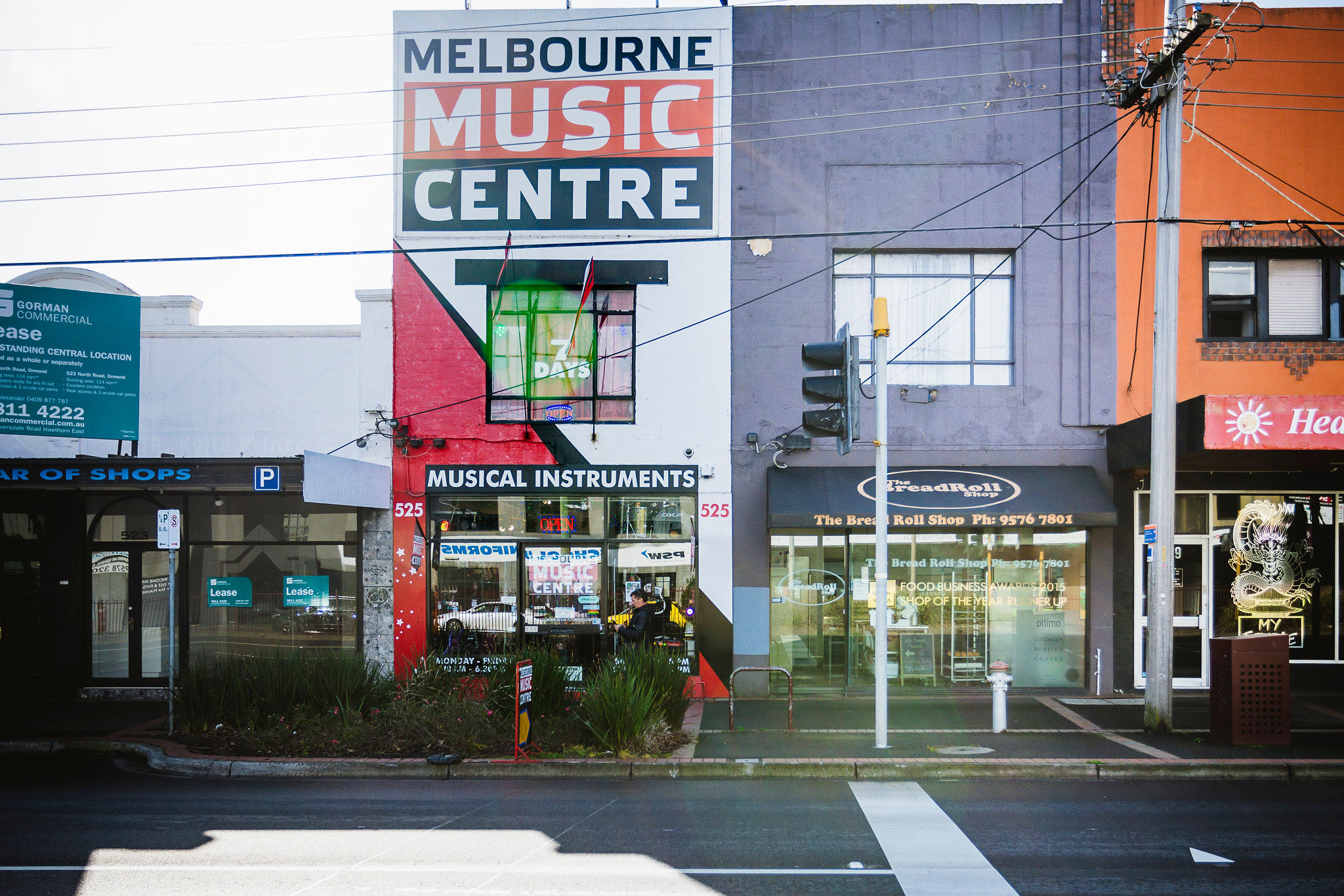Take a peek behind the scenes of some of Glen Eira’s long-running businesses. Get to know the owners and their stories and learn how Glen Eira’s streetscapes have changed over time in our digital exhibition Talking Shops: Glen Eira Stories.
Melbourne Music Centre
est. 1989
Address: 525 North Road, Ormond
From an interview with Brad Coates in 2021 by by Aron Lewin and Tatiana CC Scott from Tales of Brick and Mortar. Interview edited by Aron Lewin. All Photographs © Tatiana CC Scott. Developed for Glen Eira City Council for the Talking Shops project.
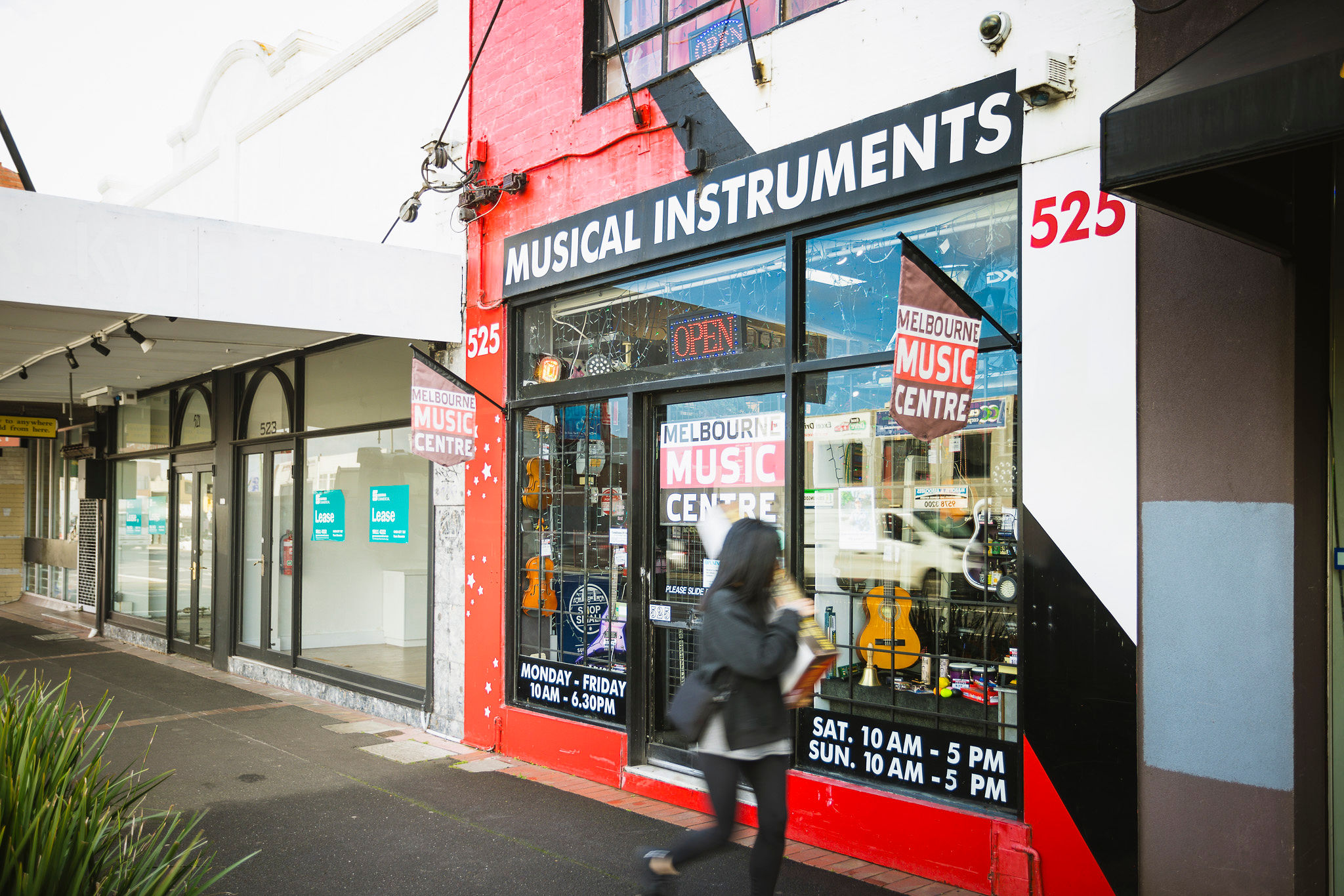



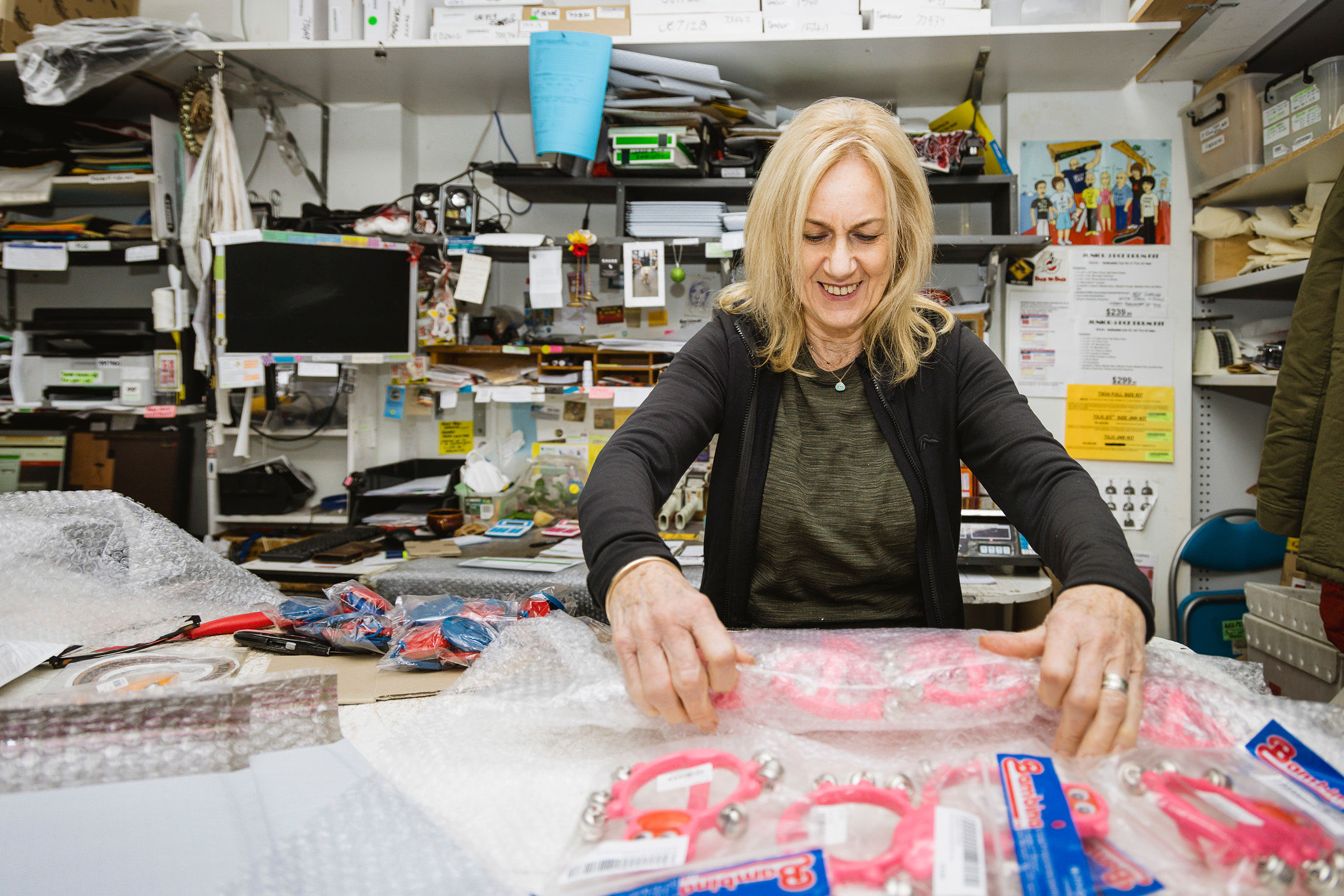
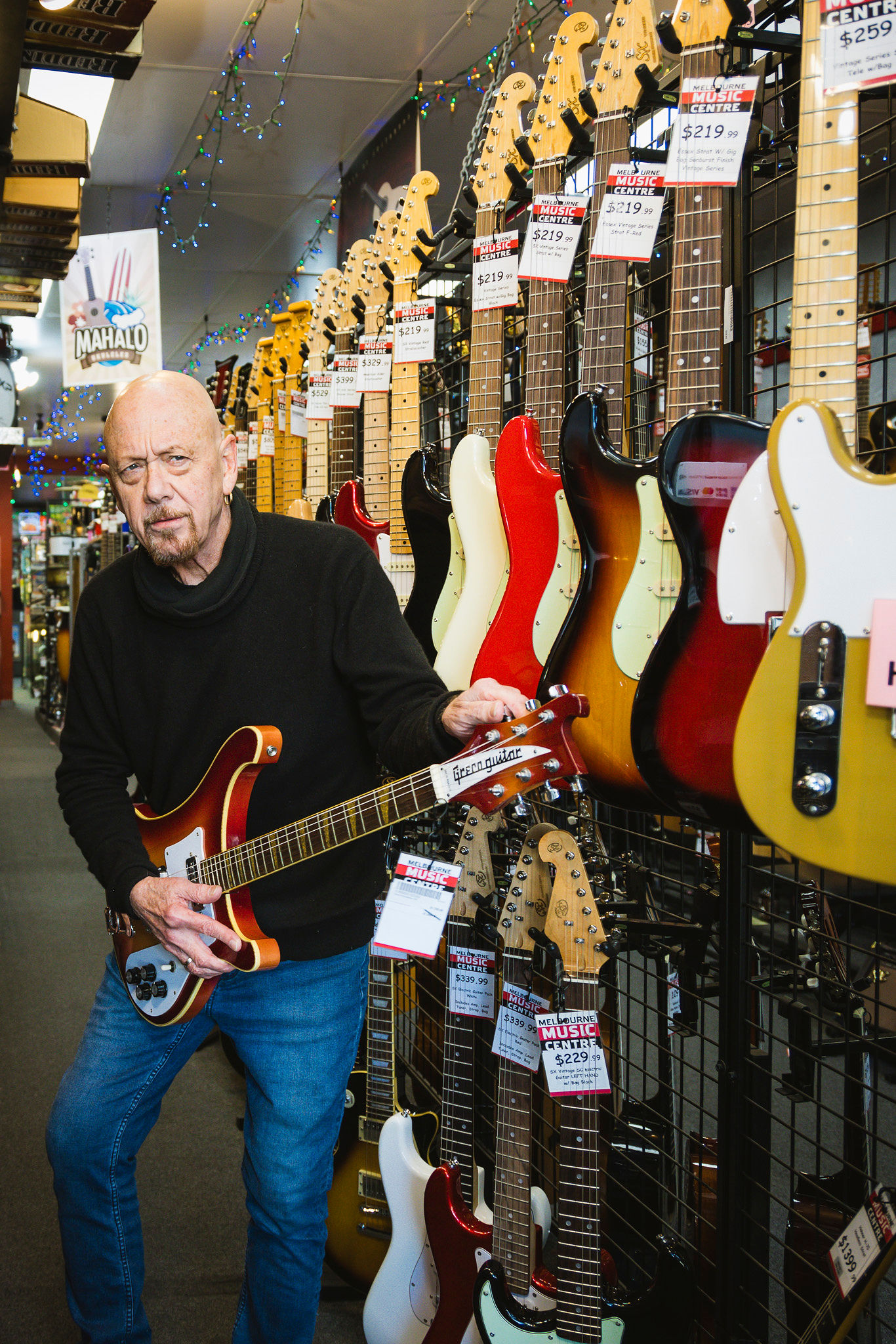
I was a musician before Melbourne Music Centre started.
I started playing in school in New Zealand – around 1969. I got my first television and recording gig by lying about my age. I was 15 - I told them I was 18.
Being a rock and roll musician is pretty well a game of snakes and ladders. One moment you're up at the top, next minute, you're right back down the bottom again. That's the best analogy I can possibly give. I was in a number of successful New Zealand bands. There was a good lot of success there, but success doesn't necessarily mean long term financial success.
I was a keyboard player, and initially came to Australia after winning a National Battle of the Bands competition in 1971, with a band called Tramline. (One of the prizes for winning) I lived in Kings Cross and we did the Whiskey/Chequers/Stagecoach circuit. That was quite an eye-opener for a relatively naïve 17yr old from what was at the time a rather sedate Auckland.
I ended up returning to NZ after the contracts finished and spent the next 8 years constantly touring that country. My second, and final, return to Australia was with a band called The Newz. We came at Michael Gudinski’s request, who flew over specially to see the band he’d been hearing about, at an outdoor concert in NZ.
On arriving in Melbourne we were immediately doing supports with such acts as Midnight Oil, Cold Chisel, Australian Crawl and all the big names at the time, but we considered the contract that Mushroom Records offered to be ridiculous compared to other offers from EMI, Polygram, RCA and Powderworks.
We couldn’t sign it.
I look back at what I had spent on musical equipment at that time, amounting to about $100,000 in 1980.
I was thinking, “This is ridiculous.” I didn’t own a home but was spending this amount on equipment. Each keyboard would’ve cost $6000-$7000, and it went out of date in three to six months. So, you had to keep updating.
I worked full time as a musician until about 1988, then I started dabbling with secondhand sales. I started selling my own gear out of my home in East Brighton with my partner Deni. Our son, Morgan, was born in 1992. Working as a musician required going out of town a lot of the time, and I didn’t want to be the dad that was always away. You only get one shot with your kids.
But I had been performing at what really was the peak of rock and roll, and that was a blast!
We had some VERY good times.
I initially started selling my own equipment, and realised I could make a profit doing this.
I then started buying things to sell as well.
I was able to make the change from playing to selling because I had 20 years of experience, and I was a gear-nut. Prior to the internet’s armchair researchers, people didn’t have that knowledge. It was either hands on experience or consulting a library.
We still find that 75 percent of our business comes through the shop door, in-part because customers want to speak to somebody.
After a while, I started to specialise in manufacturing and lighting.
I used to look after the lighting for bands, and I was interested in the technical side of things. The PA, the lighting – all that stuff. I worked with a partner on a business called CC’s, but it didn’t last. We were really good friends, but terrible partners.
In the early days, the transition from musician to small business owner was really difficult. I mean, who wouldn’t want to be playing in bands? It was a great life. I was still playing part time, and only stopped playing in the late 1990s.
At the time, we couldn't get some of the stuff we wanted, so we made it ourselves. There was an avenue to make products cheaply, and we had a large concrete apron allowing us to put manufacturing sheds out the back of the store. We were also one of the first music businesses in Australia to use the internet.
We set up our website in 1995 and were doing online auctions in 1996 - eBay didn’t start until 1997. We also set up classified advertising online. Both were later shown to be great ideas, just a good ten years too early for Australia, and we let those two ideas slowly fade away.
Then the world got really good at making things cheaply.
Vintage instruments were also a big part of the 1990’s business, and we’ve now got back into it over the last 18 months.
Back in the day – in the mid-1990s through to the early 2000s – we were probably the biggest vintage instrument dealer nationwide. Now we’re back to where we started, which is a lot of fun. It’s all coming on consignment from Japan. We get great stuff, because they are so overloaded in Japan with secondhand items.
There's not really a large secondhand market in Japan, and the rest of us are only too happy to have it.
We're getting items that are released on the Japanese domestic market that doesn't necessarily get exported elsewhere. It’s anything to do with music: all sorts of effects, keyboards, guitars. Kotos, harps and whatever else they throw in a container. It’s like a treasure trove. It’s quite phenomenal what we’ve been sent.
We also sell anything and everything – except brass and woodwind, as there used to be a shop that specialised in that across the road – and have focused heavily on accessories since 2010.
If you look at the walls downstairs, they are chock full of accessories.
We also do repairs.
That’s not so much a money making side of the businesses – it’s more of an essential service for our customers. I’m a keyboard player, but if someone comes in with a broken guitar string, I’ve learned how to fix it, restring a guitar, do a setup and intonation and so on. But, as goods became so cheap out of China in particular, compared to Australian labour costs, larger repairs have basically become redundant.
For instance, to restring a guitar, the labour costs might be $40. It can sometimes take up to an hour, and people say, “Oh god, that’s so expensive.” I usually say, “Ring your plumber, ask him how much their call out is, and we’ll do it for a third of that price.”
That gets the message across.
They realise “Oh, right, okay.”
“I guess it's not expensive after all.”
We’ve been in Ormond for 30 years now.
We’re a destination store.
When we started, some people recognised me for my music. A few older guys still do. We also did mail order catalogues, and advertised through various magazines, yellow pages, industry publications and so on. We built up a database of customers over time.
We also had politically incorrect advertising from the early days ... I had to go in front of the Advertising Standards Tribunal a few times. You couldn’t do that tongue in cheek advertising in our now woke climate.
Different times, but that’s how word spread.
That, and word of mouth.
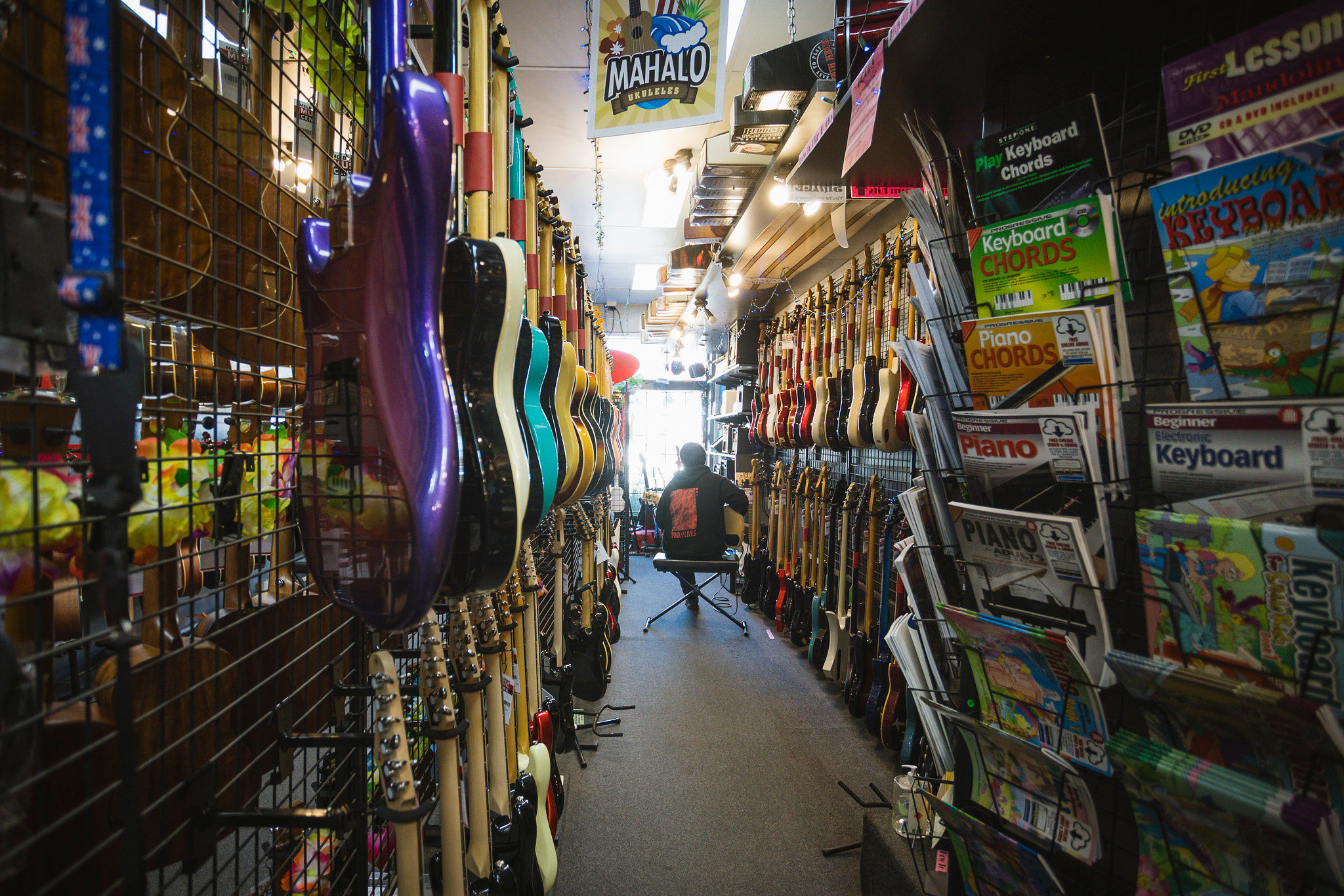
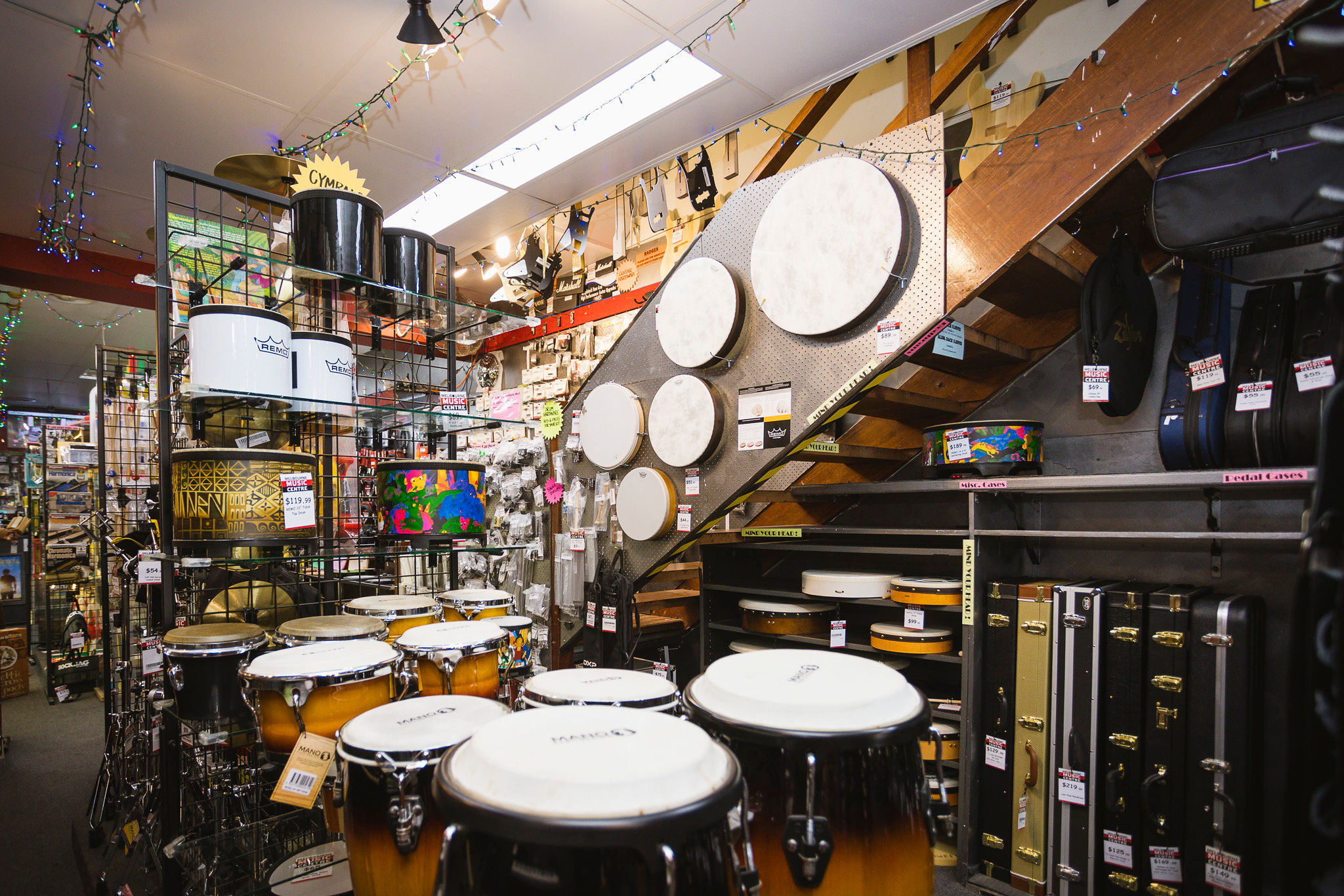


The way that music has changed has definitely affected our business.
For instance, when Poodle-Rock was big, with preening and posturing, big hair, musicians in the 1980s, that was massive for the sale of pointy guitars. The biggest time for guitar sales that I can recall was when Dire Straits toured here in the 1980s.
I still follow music pretty closely, in part because of the guys around me. I don't like specific artists per se – I'm more interested in individual songs. I’ve always been that way, rather than the idol worshipping. I know that you’re only three minutes away from your first million dollars.
I've been through it in my own life.
That success can be fleeting, very fleeting.
After the introduction of pokies in the late 1990s, we quickly transitioned from selling high-end equipment for pros, to entry level for beginners.
When the state government introduced pokies and handed out licenses to every man and their dog, that industry collapsed virtually overnight. All these clubs, pubs and hotels that used to employ entertainment to bring people in, could now install poker machines instead. We saw the writing on the wall with regard to it being a deathblow for the local music industry and pulled right out of the high-end sound reinforcement and lighting equipment. Likewise with the more upmarket instruments.
We went straight into entry level. The easiest way to explain it is, we went from, ‘Don't you know who I am?’ to, ‘Please and thank you very much.’ That's the difference with the customer base. While working with the real pros is great, I love working with families and beginners who are excited to learn. It’s just nice. People are grateful and friendly, and it’s always good looking after kids. You build that connection with people, and you know that you’re actually helping them.
I’ve also seen the progression of people, and their musical abilities over the years. That level is getting higher and higher all the time. People used to take a long time to learn. Now they're on a computer and everything is spelled out for them via a YouTube tutorial. They’re starting from a higher level because of that technology.
YouTube has been the biggest change, and the good side of it is that more people are getting into music.
Our staff have generally been here for a long time.
They’re all musicians. It’s not an essential requirement, but it's just how it has panned out. Ben plays keyboard and is a singer in a band. Tom plays guitar as well. It’s the same sort of thing with our weekend staff.
My partner, and mother of my son, Morgan, came onboard once Morgan was old enough, and has been a constant and great asset to the business right through, tolerating the ups and downs of running a small business alongside me.
Our customer base is predominantly primary school kids. We also get customers who played as a kid, stopped for a while, then get back into it. Particularly with the high end, collectible stuff, the customer base is typically people who played when they were young. Now they're older – in their 50s – and they'll buy what they could never afford at the time.
I’ve spent my life around music and – if you're involved in any facet of the arts – it’s going to be rewarding. It’s frustrating, too. Unfortunately, we were in an era where we tend to ignore the arts. You need both sides of the brain, which interact with each other. There’s very good evidence showing that kids that play music perform about 25% better academically, and over 30% mathematically.
It’s logical when you think about it because music has mathematical intervals.
I stopped performing around 1999.
I'm not silly enough to think that people want to go and see an old man up on stage anymore. if you're able to maintain it, all well and good – the Elton John's and Bruce Springsteen’s of the world can maintain it, but that’s about it.
I’ve got a little studio at home. I play and write songs with my partner for the hell of it. My son also plays. When he was about 13 years old, I said to him, “You play really well.”
“Have you thought about getting some mates in a band?”
He looked me up and down, and said, “No dad, I don't want to end up a loser like you.”
It was a fair cop, because it's been a struggle at times. But the business keeps changing.
You adapt or die.
A word of advice for people buying an instrument is not to go on blogs and forums.
There’s so much misinformation.
For instance, with ukuleles. I was so exasperated that I printed out and laminated a sign that said something to the effect of, “Contrary to popular opinion, Mahalo ukuleles machine heads do not slip. However, if you buy them from an online seller who takes them off the shelf and sends them to you, they're going to go out of tune straightaway.” It takes ages to stretch them, and the ones online haven’t been set up in the first place.
Violins are similar, as strings stretch. A pro violinist will use their ear. If they have their own violin, they’ll have a string stretcher on the side of the stage. It looks like a violin, but without the body. If they break a string onstage, they can quickly whip on another string.
People come to us because we’ve been around for a long time, and trust that we have that knowledge and expertise. They’re also often overwhelmed by misinformation and conflicting information online.
There’s the false economy of buying an instrument without speaking to someone who’s informed and getting the wrong thing – or something that’s poor quality or in bad condition.
Customers typically benefit from speaking to someone in person.
There are customers who have issues with their instrument and can’t get it fixed elsewhere.
They’ll come to us to fix that particular issue. We will also steer people elsewhere if we don’t have the necessary knowledge, as we're not going to take on something that’s beyond our capacity, or in need of a specialist.
I need to do this job to earn an income but, beyond that, the good people coming in and the rapport between staff is vital.
They’re not just employees, by any means.
The [things] I cop from my staff. I am often the butt of many practical jokes.
The stirring and the rapport we have help to keep me going.
